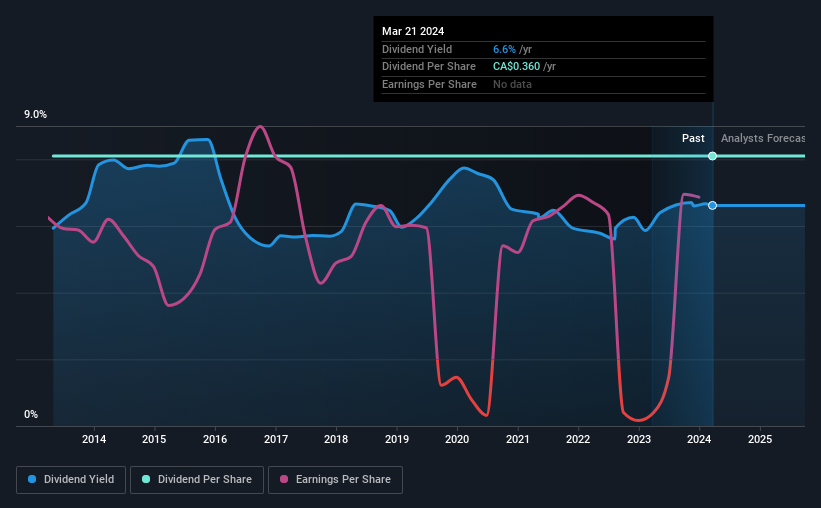Here's Why We're Wary Of Buying Rogers Sugar's (TSE:RSI) For Its Upcoming Dividend
It looks like Rogers Sugar Inc. (TSE:RSI) is about to go ex-dividend in the next four days. The ex-dividend date is one business day before the record date, which is the cut-off date for shareholders to be present on the company's books to be eligible for a dividend payment. The ex-dividend date is of consequence because whenever a stock is bought or sold, the trade takes at least two business day to settle. Thus, you can purchase Rogers Sugar's shares before the 27th of March in order to receive the dividend, which the company will pay on the 17th of April.
The company's next dividend payment will be CA$0.09 per share. Last year, in total, the company distributed CA$0.36 to shareholders. Calculating the last year's worth of payments shows that Rogers Sugar has a trailing yield of 6.6% on the current share price of CA$5.44. Dividends are an important source of income to many shareholders, but the health of the business is crucial to maintaining those dividends. That's why we should always check whether the dividend payments appear sustainable, and if the company is growing.
View our latest analysis for Rogers Sugar
Dividends are typically paid out of company income, so if a company pays out more than it earned, its dividend is usually at a higher risk of being cut. Rogers Sugar is paying out an acceptable 74% of its profit, a common payout level among most companies. Yet cash flow is typically more important than profit for assessing dividend sustainability, so we should always check if the company generated enough cash to afford its dividend. The company paid out 108% of its free cash flow over the last year, which we think is outside the ideal range for most businesses. Cash flows are usually much more volatile than earnings, so this could be a temporary effect - but we'd generally want to look more closely here.
Rogers Sugar paid out less in dividends than it reported in profits, but unfortunately it didn't generate enough cash to cover the dividend. Cash is king, as they say, and were Rogers Sugar to repeatedly pay dividends that aren't well covered by cashflow, we would consider this a warning sign.
Click here to see the company's payout ratio, plus analyst estimates of its future dividends.
Have Earnings And Dividends Been Growing?
Companies with falling earnings are riskier for dividend shareholders. If earnings decline and the company is forced to cut its dividend, investors could watch the value of their investment go up in smoke. So we're not too excited that Rogers Sugar's earnings are down 2.9% a year over the past five years.
The main way most investors will assess a company's dividend prospects is by checking the historical rate of dividend growth. Rogers Sugar's dividend payments are effectively flat on where they were 10 years ago. When earnings are declining yet the dividends are flat, typically the company is either paying out a higher portion of its earnings, or paying out of cash or debt on the balance sheet, neither of which is ideal.
To Sum It Up
Should investors buy Rogers Sugar for the upcoming dividend? It's definitely not great to see earnings per share shrinking. The company paid out an acceptable percentage of its income, but an uncomfortably high percentage of its cash flow over the past year. It's not that we think Rogers Sugar is a bad company, but these characteristics don't generally lead to outstanding dividend performance.
So if you're still interested in Rogers Sugar despite it's poor dividend qualities, you should be well informed on some of the risks facing this stock. To help with this, we've discovered 4 warning signs for Rogers Sugar (2 can't be ignored!) that you ought to be aware of before buying the shares.
Generally, we wouldn't recommend just buying the first dividend stock you see. Here's a curated list of interesting stocks that are strong dividend payers.
Have feedback on this article? Concerned about the content? Get in touch with us directly. Alternatively, email editorial-team (at) simplywallst.com.
This article by Simply Wall St is general in nature. We provide commentary based on historical data and analyst forecasts only using an unbiased methodology and our articles are not intended to be financial advice. It does not constitute a recommendation to buy or sell any stock, and does not take account of your objectives, or your financial situation. We aim to bring you long-term focused analysis driven by fundamental data. Note that our analysis may not factor in the latest price-sensitive company announcements or qualitative material. Simply Wall St has no position in any stocks mentioned.

